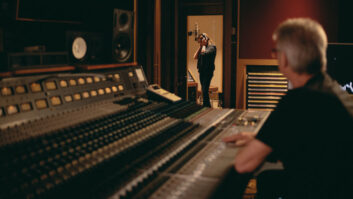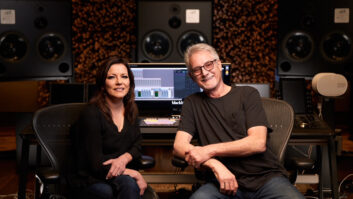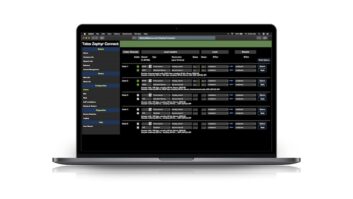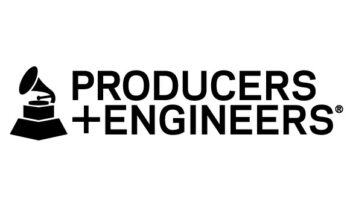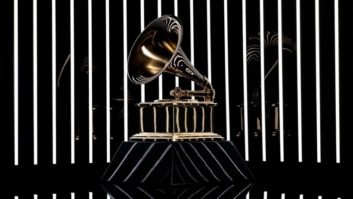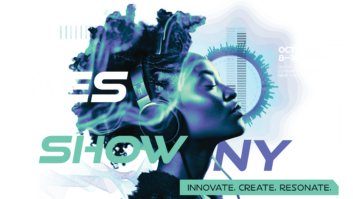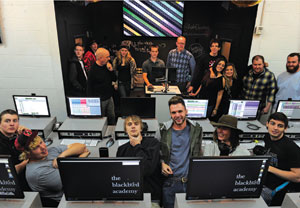
Students, instructors and staff in the 30-station classroom, with API 1608 console and two iso booths.
Photo by John Partipilo.
Studios have held classes for nearly as long as there have been studios. In a previous generation, studios were the classroom and engineers and techs were the teachers. For decades, across the country, countless recording studios have hosted nighttime classes, equipment certification programs and weeklong workshops within their control rooms and out in the field. The one thing they all seem to have in common is a desire to bring the studio back to the classroom, to re-establish the mentor-assistant/master-apprentice relationship.
But no facility has committed itself to mentor-based, studio-driven education quite like Blackbird Studio in Nashville, at least not that we’ve seen. The inaugural class opened The Blackbird Academy on September 30, 2013, and six months later they will enter the recording industry “fully prepared to make a hit record,” says Blackbird Studio owner and Academy founder John McBride.
“I have had an incredible education since we started Blackbird Studio in 2002,” McBride says. “I was able to learn from the best—people like Phil Ramone, Andy Johns, George Massenburg, Elliot Scheiner, Dann Huff, Dr. Luke and so many more. I learned more in the first two years being around great engineers and producers than I would have learned on my own in a decade. I never stop learning, and I knew that I couldn’t keep this incredible opportunity to myself. I knew it was time to give back.
“The older I get, the more mentoring becomes not just something I want to do, but something I have to do,” he continues. “Martina [McBride] and I have always talked about starting a school, and we finally found the right time and the perfect people—people who share our vision to build the perfect audio school.”
Yes, it’s different for John McBride. His business partner and wife is a rock star, and he has A-list talent on speed dial. His studio is among the best in the world and consistently filled with hitmakers. And his gear collection is unrivaled, period. In the first four weeks, visiting lecturers/mentors have included, among others, Tim McGraw, Fray drummer Ben Wysocki, famed Motown engineer Bob Ohlsson, engineer Brian Malouf, and the head of Blue Note, producer Don Was.
But that doesn’t guarantee that McBride can run a school, or fill the 30 seats each quarter. Education is a different animal than the studio business, with different expectations. He knows that. He’s the son of a Wichita State professor. He has been talking about starting a recording school since before he opened Blackbird.
A School From Scratch
The first four employees of The Blackbird Academy were hired in March 2013, and nine months later school started. The first class in the Academy’s Live Sound program, limited to 20 students, begins in January 2014. That’s fast by any standard. There are licenses to obtain, catalogs to publish, instructional materials to create, promotional efforts to launch, prospective students to reach, and, of course, a classroom—and a concert stage—to build.
Blackbird is a busy, working nine-studio complex. The students spend full days in Studios A, B and I with their Neve 8078, API Legacy and digital consoles respectively, while the days spent in the classroom focus on theory, application, recording, critical listening, and fundamental concepts. Says McBride, “We are spending a lot of time on etiquette in the studio and on the road, as we feel this is a critical aspect to a successful career.”

A five-student group setting up for a session in Studio I.
McBride owned a building next door, and in March he and Kevin Becka, co-director of education, began laying out the floor plan for a classroom and offices. On a whim, Becka contacted Katie Couric’s production team to see if they would be interested in a profile of the new school. That turned in to a connection with noted designers Bob and Cortney Novogratz, who helped with an Extreme Classroom Makeover and a spot on Couric’s morning show. Blackbirds fly across the back wall, an API 1608 sits at the teacher’s desk, and each student has a workstation that is the envy of many professionals.
“We designed a unique space that is really a working studio with 30 high-end digital audio workstations, two isolation booths and an API 1608 console,” Becka explains. “Each seat features Apple Logic Pro, Pro Tools and a Universal Audio Apollo interface with every UAD-2 plug-in the company offers. But it wasn’t about the isolated student experience at these stations; rather, it was how we could tie them all together. We started with three 65-inch flat-panel TVs, each pushing six video sources to the students. We have cameras in each of the iso rooms, above the console, and in the back of the room. Students can view the teacher’s computer, the main DAW computer’s screen from our machine room, or AirPlay off the teacher’s iPad or laptop.
“On the audio side,” he continues, “Blackbird technical staff, including Nick Shasserre and Richard Ealey, along with Michael Rhodes from SkinnyFish Studio Services, put together a patchable network where we can send eight channels of audio to each student’s workstation, plus get two channels back for playback over our wall-mounted Dynaudio main monitors. This allows the classroom to host sessions where 30 Pro Tools stations can record simultaneously, after which each student can mix locally at their stations, then send it back to the instructor who can push it to the monitors for all to hear.”
Six-Month Curriculum
Becka, who has more than a decade of audio education experience in addition to 30-plus years as an engineer, shares a co-director of education title with Mark Rubel, a producer-musician-engineer-consultant with “85 semesters of teaching recording.” Rubel led the development of the six-month curriculum and serves as primary instructor.
“We think that six months is the right period of time for our program,” Rubel says. “All our time is spent on recording and audio, and it is an intensive experience. By limiting each entering class to 30 students, we can take the time for personalized instruction. And with a max of five student engineers per control room during their time in the studio—which comes out to more than 50 percent of their time here—they get maximum time at the board. We have the rare opportunity to present the proper balance of theory and application, then give them a vessel like Blackbird Studio to place it in. We hit the red button in the first week! But we also teach them how to comport themselves in a real studio and how to take care of their own business.”
Besides Becka and Rubel, the core of The Blackbird Academy staff includes Director of Student Operations and Marketing Carma Bandstra, who logged years on the road as a tour manager, followed by a stint at Full Sail; Director of Live Sound Tony Cottrill, a studio and live sound engineer with more than 35 years as a teacher; and Leeann Carlen, Executive Assistant/Publicity, a Belmont University grad with seven years in artist management. They are backed by Blackbird studio manager Scott Phillips, who handles artist relations and scheduling for the Academy; and Nick Shasserre, Blackbird assistant studio manager and IT director who manages Human Resources for the Academy. More are being hired by the end the year to expand their outreach.
More to Come
The Blackbird Academy Live Program is set to start in January, limited to 20 students per six-month cycle. Classes will take place at an offsite facility across Clair Global Nashville, with a curriculum that incorporates all things tour-related, with emphasis on etiquette and getting along on the road. And the second round of studio students will be entering at around the same time.
Then there’s a two-day Beats and Business Seminar with Will Power set to take place the same month. A weeklong Blackbird Studio Sessions with special guests. And then the weeklong summer camps for high school students to prepare for…It’s busy, and it’s just starting. Still, it’s a new venture and there are no guarantees. McBride is both realistic and optimistic. “The support we are getting from the industry is both overwhelming and exhilarating!” he says. “But we know that our success is based solely on the success of our graduates, and I just know they will succeed. We are preparing them for a great career in audio engineering, whether live or studio. This is about passion. We won’t ever let them forget that attitude is 99 percent of the gig!”
Tom Kenny has talked with John McBride often over the past two years about audio education and The Blackbird Academy. He also has served on the Advisory Board at Full Sail for five years and speaks occasionally at colleges. Mix technical editor Kevin Becka is the co-director of education at The Blackbird Academy.
